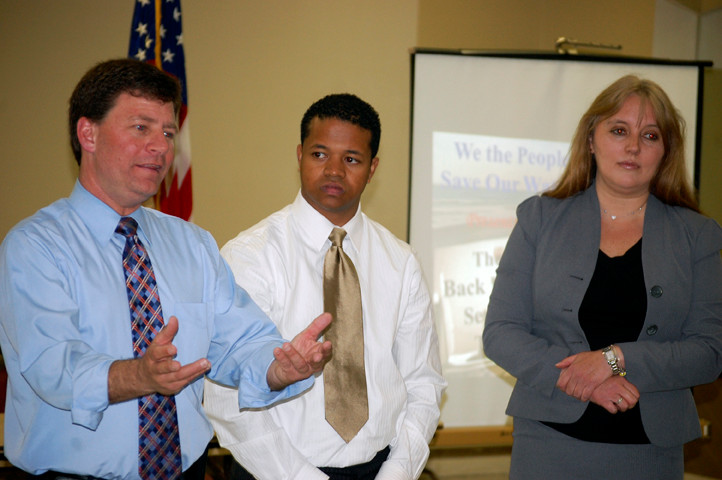‘Can we afford to flush?’
Legislators, civic leaders question plans to privatize county sewer system
A trio of Democratic legislators expressed their concerns about Nassau County Executive Ed Mangano’s plan to privatize the county’s sewer system at a meeting at the Valley Stream American Legion hall on April 12.
A group of about 50 residents, municipal and civic leaders heard from county Legislators Carrié Solages, David Denenberg and Delia DeRiggi-Whitton, who said they are not convinced the plan would save taxpayers money. They also said that Mangano has released very little information about the plan so far, saying it is reminiscent of his plans to privatize Nassau bus and consolidate the police precincts.
According to Mangano, the plan would generate $865 million for Nassau County. $465 million would be used to pay off debt related to the sewer system, and $400 million would be earmarked to pay off other county debt.
Legislators say that $400 million would be used to balance the county’s budgets in 2013 and 2014. “Although it would be a one-shot infusion that will cover our budget deficit,” Solages said, “long-term it is not a good idea for our county.”
Solages, who represents the 3rd District, said that by selling of one of Nassau’s biggest assets, it could affect the county’s bond rating meaning higher interest rates to borrow money.
Denenberg, representing the 19th District, added that the sewer system is very attractive to developers, who don’t have the option to tie into a municipal sewer system throughout much of Suffolk County. “It’s a way that we can attract businesses,” he said.
He also questioned how Nassau’s sewer system could be privatized without impacting property owners. Denenberg said that a private company is going to have to run the system, pay off its debt, make capital improvements and make a profit, along with a nearly $1 billion upfront payment to the county. “They’re going to do all of this… without you paying a cent more,” he said. “Who believes that?”
DeRiggi-Whitton, of the north shore 18th District, agreed. She noted that there are three companies currently vying for long-term control of Nassau’s sewer system. “They need a profit,” she said. “They’re going to want a profit. The only way to get that profit is to cut services or possibly charge more.”
Three companies under consideration are Veolia, which took over operation of the Nassau County bus system this year, United Water and Severn Trent, which operates the Glen Cove sewage treatment plant.
Denenberg said that when private companies take over public utilities in Nassau County, it usually ends up with taxpayers paying more. He said the average annual water bill for a homeowner in a public water district is $300 per year. For a resident who gets their water from a private company, it is more than $1,000 per year. “We know that private monopolies over public necessities have never worked here,” he said.
Claudia Borecky, president of the North and Central Merrick Civic Association, also had great concerns about the privatization efforts. “This is nothing more than a one-shot budget fix,” she said.
Borecky said that if a private company takes over, the county will lose control of its sewer plants. That is especially concerning, she said, if hydrofracking waste water is sent to those plants. Residents and county officials would have little or no way of finding out what is in that water, she said, because private companies are exempt from Freedom of Information laws.
Residents want to be part of the conversation about the sewer privatization plans, Borecky said, and don’t want to be kept in the dark, especially when it could impact their wallets. “Do we really want to worry about whether we can afford to flush?” she asked.
A typical homeowner pays about $185 per year in county sewer taxes.
Sheila Shaw, the county’s commissioner of Public Works, handed out information which she said refutes the claims of the three legislators. “The county executive remains committed to protecting residents in Nassau County from any kind of rate hike,” she said, adding that residents are encouraged to come to her office to learn more about the plan.
She also stressed that the plan would not sell off the county’s sewer system. “It is just a lease,” she said, “a long-term lease but it is not a sale by any means.”
Deputy Commissioner of Public Works Richard Millet said that the reason many of the details have not been released yet is because no company has been chosen to operate the sewer system. “The relationship has not been solidified with the county,” he said. “It’s so early, it’s almost impossible to answer the pointed questions that haven’t been tied down to minutia.”
The county’s four-year budget plan includes the expectation that it will receive this infusion of cash from the lease of its sewer system. Several people in attendance questioned why Nassau was counting on this money. Millet responded that any long-term budget plan, business or municipal, includes projections that might not come to fruition.
Adam Haber, a member of the Roslyn school board, questioned the relationship the county has with Morgan Stanley, which has been picked by Mangano to do the financial analysis for the potential privatization of the sewer system and would get $5 million if any plan goes through. He said there should be independent council guiding the county in this process.
Shaw said that when there is more information, there will be outreach by the county executive’s office to inform the public. Solages added that he wants to make sure that is the case. “Let’s keep our sewers underground,” he said, “and not the negotiations.

 50.0°,
Overcast
50.0°,
Overcast 




